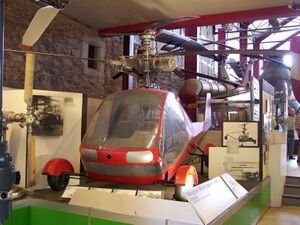Engineering:Wagner Aerocar
| Wagner Aerocar | |
|---|---|
 | |
| General information | |
| National origin | Germany |
| Manufacturer | Wagner |
| Designer | Alfred Vogt |
| History | |
| Introduction date | 1965 |
| First flight | 1965 |
| Developed from | HTM Skytrac |
The Wagner FJ-V3 Aerocar was a prototype 4-place flying automobile. The vehicle used contra-rotating rotor helicopter technology for flight.
Design
The Aerocar was developed in the era of space-age futurism, and looked the part. It looked slightly like the Jetsons flying car, with a large bubble cockpit, tailfins, and disproportionately small wheels for a car. It was developed from the Rotocar III design which was based on the Sky-trac 3 helicopter. The helicopter used counter-rotating rotors. On ground propulsion to the wheels was through a hydraulic linkage to the engine.[1]
Operational history
A prototype with the registration D-HAGU was completed and flown in 1965.[2] The Franklin 6AS-335-B engine was replaced with a 134lb, 420shp Turbomeca Oredon turbine engine with a front-mounted gearbox. The design was sold to Helikopter Technik München (HTM). HTM suspended development of the Aerocar in 1971.
Variants
Specifications Wagner Aerocar
General characteristics
- Capacity: 4
- Powerplant: 1 × Franklin , 190 kW (260 hp)
Performance
References
- ↑ "Resources and Information". http://www.unrealaircraft.com/roadable/wagner.php. Retrieved 15 December 2018.
- ↑ Air pictorial journal of the Air League, Volume 30.
External links
- Flight International, June 1968
- Aero Engines; Flight International, January 2, 1969
- "Search Results". https://abpic.co.uk/pictures/search/?q=Wagner+Rotocar+3&f=type&search_type=simple. Retrieved 15 December 2018.
 |
